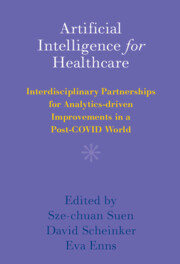 Artificial Intelligence for Healthcare
Artificial Intelligence for Healthcare Principles and Practical Lessons from Projects at Three Hospitals
from Part II - Optimizing Healthcare Systems
Published online by Cambridge University Press: 21 April 2022
This chapter provides an introduction to analytics-driven hospital capacity management through three projects that employed mathematical programming and discrete event simulation to address common challenges. The first project used mathematical programming to identify the mix of patients at Stanford Hospital that would maximize revenue given the capacity of hospital resources after a planned hospital expansion. The second project used discrete event simulation to plan the physical capacity and operational profile of a new procedural space at a hospital in New England. The third project combined mathematical programming and discrete event simulation to create a tool to schedule surgical procedures at Lucile Packard Children's Hospital Stanford.
To save this book to your Kindle, first ensure [email protected] is added to your Approved Personal Document E-mail List under your Personal Document Settings on the Manage Your Content and Devices page of your Amazon account. Then enter the ‘name’ part of your Kindle email address below. Find out more about saving to your Kindle.
Note you can select to save to either the @free.kindle.com or @kindle.com variations. ‘@free.kindle.com’ emails are free but can only be saved to your device when it is connected to wi-fi. ‘@kindle.com’ emails can be delivered even when you are not connected to wi-fi, but note that service fees apply.
Find out more about the Kindle Personal Document Service.
To save content items to your account, please confirm that you agree to abide by our usage policies. If this is the first time you use this feature, you will be asked to authorise Cambridge Core to connect with your account. Find out more about saving content to Dropbox.
To save content items to your account, please confirm that you agree to abide by our usage policies. If this is the first time you use this feature, you will be asked to authorise Cambridge Core to connect with your account. Find out more about saving content to Google Drive.